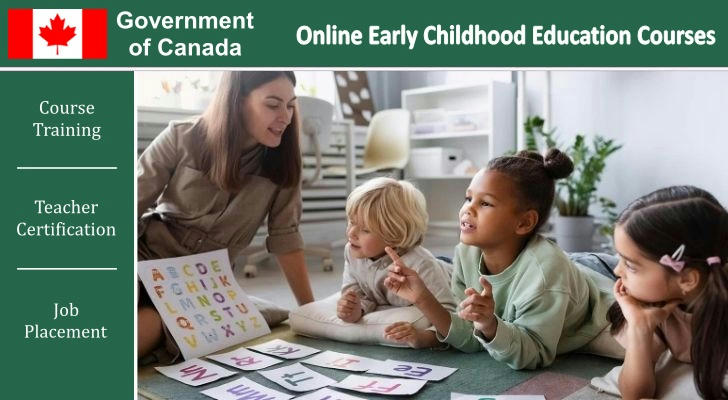How to study early childhood education online?
The government offers online learning courses, training, teacher certification, and job placement.
Early Childhood Education is one of the most fundamental areas of child development. If you wish to contribute to the well-being of children, then studying this career is an excellent choice. This article will explain how to study early childhood education online and how to take the first step towards a successful career in this field using the resources provided by the institution.
What are the government-supported early childhood education certification courses in Canada?
The Government of Canada provides funding for a variety of certified early childhood education (ECE) programs through a partnership between federal and provincial governments. These programs are designed to train early childhood educators to teach and care for children aged 0 to 5 years in child care centres, kindergartens or home settings. Funding is provided in the form of online courses, tuition subsidies, scholarships and additional training places, and is administered by provincial ministries of education or related agencies and supported by federal funds such as the Canada-Provincial Early Learning and Child Care Agreements.

What are the government-supported early childhood education certification courses in Canada?
- Ontario - Ontario ECE Grants
Supports ECE diploma programs (such as 2-year programs) and leadership certifications, covering child development, teaching methods, and curriculum design. Provides education grants, travel grants, and training allowances, and has supported over 20,000 people since 2007.https://ecegrants.on.ca/
- Alberta - Level 1 ECE Online Program
45-hour online course that teaches child development and basic care, meeting Level 1 certification requirements. Government-supported, available in English and French.
- British Columbia - ECE Education Support Fund
Supports certificate (1 year), diploma (2 years), and bachelor's degree (4 years) programs, such as Capilano University's ECE program. Grants support tuition, and $62 million investment in 2023 will add 750 seats.
- Saskatchewan - ECE Certification Program
Saskatchewan Polytechnic offers 1-year certificate and 2-year diploma programs, including health, safety, and child guidance. Over $2 million in scholarships each year.
- Quebec - AEC and DEC Early Childhood Education Programs
AEC (24 months) and DEC (36 months) programs covering child development and educational practice. Government loans and grants available, starting at approximately $670 per semester.
- Canada Nationwide - Family Child Care Training
10-module online course (30 hours) covering child development and play roles. Partially funded by the Canadian Child Care Federation (CCCF).
- Ontario - Child Development Practitioner Apprenticeship (OYAP)
High school students learn the basics of ECE through a dual-credit course that leads to a diploma program. Government and college partnership.
Benefits of participating in these programs
✅ Professional certification: Obtain an officially recognized certificate or diploma to enhance your ECE professional qualifications.
✅ Financial support: Low-cost training reduces the burden of tuition fees, especially for low-income groups.
✅ Flexibility: Online and hybrid courses are suitable for working people or those living in remote areas.
✅ Employment prospects: Certification increases employment opportunities in child care centers or kindergartens.
Why does the government support these courses?
Addressing the ECE shortage: Canada faces a shortage of early childhood educators, especially after the epidemic, and the government has increased training opportunities through funding.
Improving the quality of education: Training qualified ECEs ensures that children receive high-quality early education and promotes cognitive and social development.
Promoting equity: Funding programs help residents in rural and disadvantaged communities enter ECE professions and narrow education gaps.
Economic benefits: Supporting the development of the child care industry, enabling parents to return to work, and stimulating economic growth.
How to participate in these courses?
Find a program: Visit the websites of provincial governments or relevant agencies.
Application process: Submit an application form, usually requiring proof of education, identity and residence.
Specific steps:
Ontario ECE Grants: Apply online, requiring proof of ECE course registration.
Alberta Level 1: Register through Alberta.ca, no additional fee.
BC Support Fund: Contact ECEBC, submit tuition receipt and application.
Requirements for participation
Education: Most programs require high school graduation, and bachelor's degree programs require a diploma or equivalent.
Age: Usually 19 years and older (except OYAP, which is for high school students).
Residence: Some programs are limited to provincial residents, such as Alberta and BC programs.
Language proficiency: English or French proficiency, depending on the language of the course.
Real life examples
Real case study 1:
Fumiko enrolled in Seneca Polytechnic’s ECE diploma program, which is supported by funding from the Ontario and Canadian governments, including a $2,000 tuition subsidy for May 2025 enrollment. After completing the program in 2007, Fumiko returned to Japan to work at an international kindergarten and later became an English teacher, incorporating ECE skills into her teaching and was well received by students and parents. In 2011, she opened her own FLAT English school to provide virtual internship opportunities for Seneca students.
Real case study 2:
Tara, an Indigenous mother of five children, enrolled in Algonquin College’s online ECE program, which is government-supported and offers flexible learning options. She used the course to improve her skills while working as a special needs resource teacher. Despite facing network connectivity issues, the support of virtual mentors helped her overcome challenges. After graduation, she is proud of her pursuit of education as an Indigenous woman and continues to work in the field of early childhood education.
Conclusion
The Canadian government-supported ECE certification program supports early childhood educator training through diverse programs to meet child care needs and improve education quality.
Early childhood education is one of the most rewarding and popular careers in Canada. Don't wait any longer! Take the first step towards a career with purpose and growth. Enroll now and turn your passion into a career!

